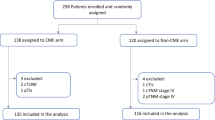Abstract
Background
The effects of conversion to open surgery during laparoscopic resection for colorectal cancer on long-term oncologic outcomes still are unclear.
Methods
All 450 laparoscopic colorectal resections for cancer performed at a single center between 1994 and 2008 and included in a prospectively maintained database were considered. Patients who required conversion to open surgery (CONV) were matched 1:2 with laparoscopically completed cases (LAP) and 1:5 with open surgery cases (OPEN) for age, American Society of Anesthesiologists (ASA) score, year of surgery, tumor location, and tumor stage. Fisher’s exact, chi-square, and Wilcoxon tests were used as appropriate. Kaplan–Meier curves were compared to analyze survival.
Results
In this study, 31 CONV cases were independently compared with 62 LAP and 155 OPEN cases. Compared with the LAP and OPEN patients, the CONV patients were characterized by a numerically higher rate of preoperative comorbidity (61.3% vs LAP, 51.6; P = 0.4 and OPEN, 48.4%; P = 0.2), male gender (77.4% vs LAP, 59.7%; P = 0.09 and OPEN, 58.1%; P = 0.05), and a significantly higher mean body mass index (29.6 vs LAP, 26.8; P = 0.012 and OPEN, 28.8; P = 0.3). The pathologic tumor stage, location, and chemotherapy and radiotherapy rates were comparable among the groups. After a median follow-up period of 4.1, 4.2, and 4.6 years, the 5-year disease-free survival rate was significantly lower for the CONV patients (40.2%) than for the LAP (70.7%, P = 0.01) or the OPEN (63.3%, P = 0.04) patients. However, the 5-year cancer-specific survival rates were similar among the CONV (94.4%), LAP (86.1%, P = 0.36), and OPEN (84.9%, P = 0.14) patients.
Conclusions
Conversion to open surgery does not affect oncologic outcomes, although CONV patients have increased comorbidity rates affecting long-term mortality.
Similar content being viewed by others
References
Clinical Outcomes of Surgical Therapy Study Group (2004) A comparison of laparoscopically assisted and open colectomy for colon cancer. N Engl J Med 350:2050–2059
Quirke P, Thorpe H, Walker J, Jayne DG, Smith AM, Heath RM, Brown JM (2005) Short-term end points of conventional versus laparoscopic-assisted surgery in patients with colorectal cancer (MRC CLASICC trial): multicentre, randomised controlled trial. Lancet 365:1718–1726
Veldkamp R, Kuhry E, Hop WC, Jeekel J, Kazemier G, Bonjer HJ, Haglind E, Påhlman L, Cuesta MA, Msika S, Morino M, Lacy AM (2005) Laparoscopic surgery versus open surgery for colon cancer: short-term outcomes of a randomised trial. Lancet Oncol 6:477–484
Gervaz P, Pikarsky A, Utech M, Secic M, Efron J, Belin B, Jain A, Wexner S (2001) Converted laparoscopic colorectal surgery. Surg Endosc 15:827–832
Chan AC, Poon JT, Fan JK, Lo SH, Law WL (2008) Impact of conversion on the long-term outcome in laparoscopic resection of colorectal cancer. Surg Endosc 22:2625–2630
Moloo H, Mamazza J, Poulin EC, Burpee SE, Bendavid Y, Klein L, Gregoire R, Schlachta CM (2004) Laparoscopic resections for colorectal cancer: does conversion affect survival? Surg Endosc 18:732–735
Casillas S, Delaney CP, Senagore AJ, Brady K, Fazio VW (2004) Does conversion of a laparoscopic colectomy adversely affect patient outcome? Dis Colon Rectum 47:1680–1685
Ptok H, Steinert R, Meyer F, Kröll KP, Scheele C, Köckerling F, Gastinger I, Lippert H (2006) Long-term oncological results after laparoscopic, converted, and primary open procedures for rectal carcinoma: results of a multicenter observational study. Chirurg 77:709–717
Agha A, Fürst A, Iesalnieks I, Fichtner-Feigl S, Ghali N, Krenz D, Anthuber M, Jauch KW, Piso P, Schlitt HJ (2008) Conversion rate in 300 laparoscopic rectal resections and its influence on morbidity and oncological outcome. Int J Colorectal Dis 23:409–417
Rottoli M, Bona S, Rosati R, Elmore U, Bianchi PP, Spinelli A, Bartolucci C, Montorsi M (2009) Laparoscopic rectal resection for cancer: effects of conversion on short-term outcome and survival. Ann Surg Oncol 16:1279–1286
Tekkis PP, Senagore AJ, Delaney CP (2005) Conversion rates in laparoscopic colorectal surgery: a predictive model with 1,253 patients. Surg Endosc 19:47–54
Figueredo A, Rumble RB, Maroun J, Earle CC, Cummings B, McLeod R, Zuraw L, Zwaal C, Gastrointestinal Cancer Disease-Site Group of Cancer Care, Ontario’s Program in Evidence-Based Care (2003) Follow-up of patients with curatively resected colorectal cancer: a practice guideline. BMC Cancer 6:3–26
Senagore AJ, Delaney CP, Brady KM, Fazio VW (2004) Standardized approach to laparoscopic right colectomy: outcomes in 70 consecutive cases. J Am Coll Surg 199:675–679
da Luz Moreira A, Mor I, Geisler DP, Remzi FH, Kiran RP (2011) Laparoscopic resection for rectal cancer: a case-matched study. Surg Endosc 25:278–283
Chua YJ, Sargent D, Cunningham D (2005) Definition of disease-free survival: this is my truth-show me yours. Ann Oncol 16:1719–1721
Ballian N, Yamane B, Leverson G, Harms B, Heise CP, Foley EF, Kennedy GD (2010) Body mass index does not affect postoperative morbidity and oncologic outcomes of total mesorectal excision for rectal adenocarcinoma. Ann Surg Oncol 17:1606–1613
Takahashi T, Kato T, Kodaira S, Koyama Y, Sakabe T, Tominaga T, Hamano K, Yasutomi M, Ogawa N (1996) Prognostic factors of colorectal cancer: results of multivariate analysis of curative resection cases with or without adjuvant chemotherapy. Am J Clin Oncol 19:408–415
Tan PY, Stephens JH, Rieger NA, Hewett PJ (2008) Laparoscopically assisted colectomy: a study of risk factors and predictors of open conversion. Surg Endosc 22:1708–1714
Chandra A, Mangam S, Marzouk D (2009) A review of risk scoring systems utilised in patients undergoing gastrointestinal surgery. J Gastrointest Surg 13:1529–1538
Disclosures
Matteo Rottoli, Luca Stocchi, Dan P. Geisler, and Ravi P. Kiran have no conflicts of interest or financial ties to disclose.
Author information
Authors and Affiliations
Corresponding author
Rights and permissions
About this article
Cite this article
Rottoli, M., Stocchi, L., Geisler, D.P. et al. Laparoscopic colorectal resection for cancer: effects of conversion on long-term oncologic outcomes. Surg Endosc 26, 1971–1976 (2012). https://doi.org/10.1007/s00464-011-2137-8
Received:
Accepted:
Published:
Issue Date:
DOI: https://doi.org/10.1007/s00464-011-2137-8




